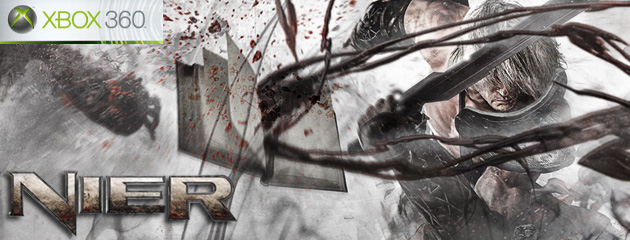
Your friends have all said, “Nier‘s rubbish, mate.” These so-called friends of yours are the kind of scum who insist that the Scott Pilgrim movie is better than the comics. They’re so shallow that they haven’t been overwhelmed by how upsetting the whole game is. Maybe they just don’t get it, or maybe they’ve never read a good book before.
Whether or not you have been educated, if you’re likely to stick a sharp object into yourself when reading a truly overwhelming tragedy novel, then you should never play Nier. This game, like any Radiohead album, should come with a health warning.
Over the course of this adventure, you will be played like a jerk. Your terminally ill daughter will be kidnapped by your own shadow. Your friends will die, or turn to stone. You’ll be left with only a talking book for company. Riddled with blind rage, you’ll go on a slaughterous rampage, never thinking about the consequences of your actions.
Stories like this require severe contemplation, and Nier makes me contemplate like no game ever has before. It’s brought up questions that I thought I was alone in asking. It’s helped me make discoveries I never thought I could make. Nier makes me think, which is something I rarely do.
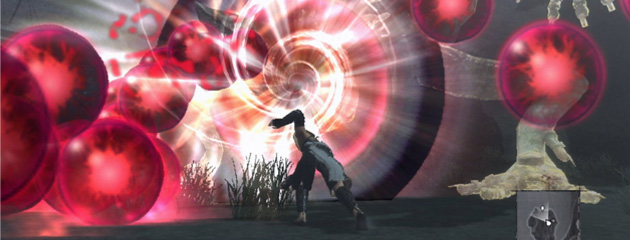
The beginning of the game is a confusing and truly emotional sequence, whereby a man is trying to protect his daughter, Yonah, from the oncoming creatures of darkness (Shades). These creatures have already claimed every other life on the planet, and it won’t be long before he and his beloved daughter are consumed. Tucked away in some library, in what appears to be slap-bang in the streets of a destroyed and snow-laden Tokyo, are two mystical books that contain the key to Yonah and her father’s salvation, and/or damnation.
Just when you’re looking for some proper answers, though, the story abruptly and thoroughly changes, leaving you bewildered. But that is actually a blessing in disguise, believe it or not. You’re left questioning what this opening sequence actually means, and you are given clues throughout the game which, trust me, you never clock onto. You suddenly realise their significance after you beat the game for the second time and get the slightly less abridged ending.
The first ending mildly joshes us with the whole “magic means everything turns out well in the end” thing, whereas the second ending poises more questions than it answers, which is what I half-expected, given that there are four endings, and so far I have only seen two.
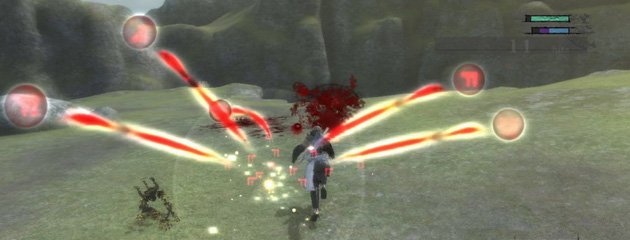
Like most RPGs, there is plenty of fighting. Thankfully, unlike Enchanted Arms, there doesn’t seem to be any need to grind, meaning you’ll be able to beat this one, Paul. Nier takes a more Monster Hunter meets Dirge of Cerberus with a sprinkling of Ocarina of Time approach—different weapons, switchable on the fly, which can all be upgraded with different abilities for different tasks. A truely bloodthirsty, honest, and spontaneous action RPG. Everything is in real-time, too; there’s no turn-based téte-a-téte shit.
Your weaponry starts off exclusively with one-handed swords, but about halfway through the game, you can also use two-handed swords and lances. Each weapon type has its own set of combos and special moves. I find that the lances are the handiest weapons, as they’re great for staying relatively nimble, and they have the bonus function of a forward dashing lunge attack (a life-saver move against smaller enemies who tend to gang up on you).
Weapons are just tools for killing people; I don’t like it any more than you do. As you play through Nier, you will have to kill a lot of people. Whilst you’re on this blood-lust, a most mind-blowing and captivating story is revealed. The story burns like a wildfire at times, but you can be sure of one thing: it’s always there, even when it’s only trickled to you cinder by cinder. You slowly (but, paradoxically, still rather quickly) discover important things, prove yourself as a man who will help others, and make “wonderful” friends—though, again at the halfway point, some start to become less wonderful.
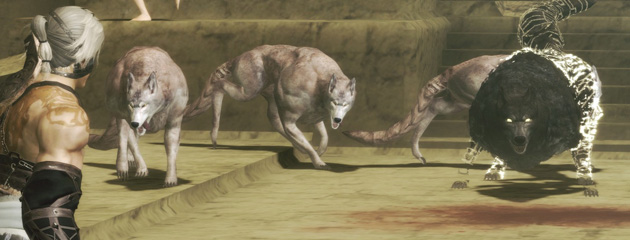
As you journey through this broken world, set hundreds of years after the apocalypse of mankind, you breathe in the atmosphere of a crumbling and dying environment. As humans continue to live only in a small number, wildlife thrives and has once again claimed superiority. In simpler terms: Sheep will bite and kick you, and it will hurt.
How the characters show interest in the books of the old world and try to understand the things inside them demonstrates the game’s depth. At one point, the main character (who I named “Dad”) may mention how his ancestors moved across the bridges in giant metal boxes, obviously referring to cars. The level of detail is here, and high.
For me to mention any more of the story in Nier, I’d have to ruin it for you. So I’m going to refrain from doing that. The entire scope of the game, and everything it achieves, just sends shivers down my rickety spine. This game took my heart strings and pulled them around until my cardiac organ ached from the inside out. Hell, it still does. And then it kicks you while you are down, barely even recovering from the absolute hell you just had to wade through.
Like a thoroughly good movie, you are left hating yourself at the credit-roll. You allowed yourself to be tricked, allowed yourself to be played. Fooled into falling in love with characters who defect, or lose their will to live, or die.
Taking into account all of what Nier does to me, and the truly absurd benevolence that it forces me to invent, I cannot recommend this game enough. This game oozes poetic astonishment, from the beginning right until the end.
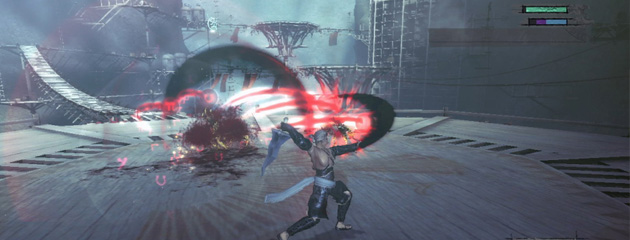
Nier is another game where scoring by the usual method of adding smaller numbers results in a score far less than it deserves. That is because there are problems, and they are apparent. Nier doesn’t do itself any favors to begin with. The visuals are quite firmly last generation (and when you’re up against an absolute beauty like Resonance of Fate, it matters that you look good). Secondly, there’s the front cover that screams “you won’t enjoy this” and “we’re copying DeathNote.” Third is the terribly lanky combat (which I enjoyed, actually. I credit the response rate to the fact that the main character is about 40 years old.)
The only other main issue besides these is that Nier‘s sidequests are so MMO that they hurt. Go here, speak with this person, bring 10 of this item, kill 20 of this enemy, etc. etc. This wouldn’t be so bad if the item you had to salvage from the monster’s corpse didn’t have a 4% probability of existing, if it’s even that high. What should be a simple quest to collect goat hides thus becomes painfully hard.
Unless you trouble yourself with the sidequests, the game is over too quickly, but I actually consider this to be a plus-point, too. All of us have less time for games than we used to, and with the story being short, you can have the game beaten though a week of good evenings, a few hours a pop. With four endings to attain, however, you will be playing for quite some time afterward if you are a completionist RPG player, or if you actually care about the characters.
Even replaying the game now for the sidequests, I feel like such an asshole. The main character, although full of the greatest of intentions, is such a massive cunt.
Even if the story wasn’t as well-thought-out and Practically-Perfect-In-Every-Way, the soundtrack is so astonishing that it draws out inner emotions and feelings from places you never thought your black heart could suck blood from. The soundtrack is so melancholic and morbid that it should definitely not be used as hold music for a suicide hotline.
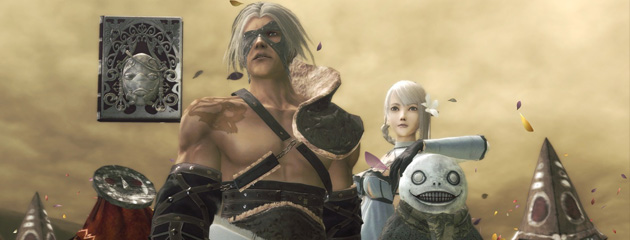
Those fourteen hours I spent completing the game—do I long for them back? No, I don’t.
I don’t want the six hours spent on the second playthrough back, either.
Or the fourteen hours I just spent starting over and completing all the currently available sidequests, half of the overall sidequests in the game.
I will put still more hours into this game as long as there is back-story I do not know, or something different in the fourth iteration of a cutscene.
I want to know everything. Storytelling this rich, in videogames these days, is absolutely non-existent. The developers of this game actually read books when they were young.
So what happens if you ignore Nier? You will have ignored the game that I consider to be the greatest RPG of all time. You will be ignoring a truly remarkable soundtrack, a tale of sadness and terror, envy and loss, distraught and destruction. You will be ignoring a “hero,” and his group of rag-tag followers, who are truly off the beaten path. You will be ignoring a genre-switching behemoth action RPG that combines the greatest things I have ever experienced into one, substantial package.
An oddity through commodity, Nier will either appeal to you completely, or you will dismiss the game entirely. In other words, you either FAIL or you don’t. You should give Nier a chance to bestow itself upon you, and you will see how a game can make you lose the will to live completely (in a good way, of course).

Hmm; I thought you disliked it at first, but you set me straight in the last few paragraphs. No fan of turn-based games here, so that’s a plus. Good article.
It is one of those games you absolutely hate for playing you like a fool, but that you love for being one of few video games that checks if you still have a soul. =)
The only games that make my soul sing are pretty much all made before 1998. Thus, anything that emulates those games is awesome in my book (unabashedly biased here.)